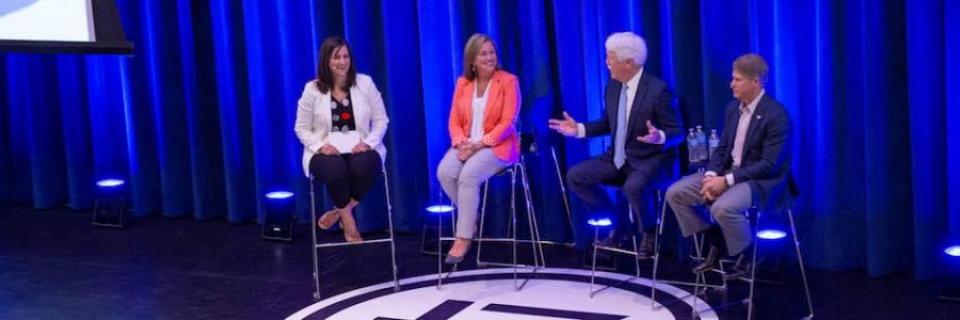KC’s Sports Leaders Talk About 2020 Experience

The next full-scale Rockhurst University Leaders Series event, with national speakers, will have to wait for another time as the world continues to recover from the pandemic.
But following a year in which many were asked to go above and beyond in guiding their organizations and everyday lives through the COVID-19 pandemic, there are plenty of fresh lessons to learn. On Thursday, the Rockhurst University Leaders Council brought some of the Kansas City community’s sports leaders to the Arrupe Hall auditorium stage for “Leadership Lessons from the Toughest Competition in 2020,” featuring Clark Hunt, CEO of the Kansas City Chiefs; John Sherman, owner of the Kansas City Royals; and Kathy Nelson, president and CEO of the Kansas City Sports Commission.
In a discussion moderated by Lisa Ginter, ’87, CEO of CommunityAmerica Credit Union, those three leaders shared their own experience of pushing through the COVID-19 pandemic and how they adjusted to changes and challenges that came up along the way.
For Hunt, the global shutdowns came, ironically, shortly after one of the biggest collective celebrations in Kansas City’s history — the Chiefs’ Super Bowl parade in February 2020. The team was in the midst of planning a celebration tour, he said, as concerns about spread of the disease swept across the U.S. and the NFL.
Sherman said he was a newly minted franchise owner at the Royals’ Surprise, Arizona, spring training facility when he heard that the season would be shut down before it even began.
“I looked down at the field, we were taking the tarp off the field, fans were coming through the turnstiles, and vendors were putting things out,” he said. “It was a kick in the gut — certainly something you didn’t see coming — but even in that moment, you could see that leaders were emerging. And over the course of the process I was really impressed and inspired by our leaders.”
For Nelson, the realization came several games into the Big 12 tournament. At first, games would be played without fans. Then, she said, officials decided to cancel the tournament altogether — a heartbreaking moment.
“I’ll never forget the emotion of those players, those Texas players, coming off the floor. A few of them, they’re all two feet taller than me, had tears dripping off of their cheeks.
All three said they relied on those around them — players, staff, health care leaders, other executives and trusted peers — to help make the decisions necessary to get them sports back on the field or keep the community engaged with athletics. The same could be said as professional sports grappled with last summer’s protests calling for racial justice. Hunt said responding meant listening to players not only express raw emotion but share ideas about how to act.
“My dad had always encouraged the players to be active in the community, and every year when the rookies come in, at training camp, I make a point of telling the players, ‘Look, if you make this team, you’re going to have a tremendous platform, and you need to use that platform to make Kansas City better,’” Hunt said.
All three agreed that the sometimes grueling pace at which things changed over the past 12 months was difficult but were optimistic that Kansas City could come out stronger on the other side.
“Billie Jean King said champions adjust,” Nelson said. “And that’s all we did, every day, every hour, we were adjusting and we had to have that championship mentality.”







